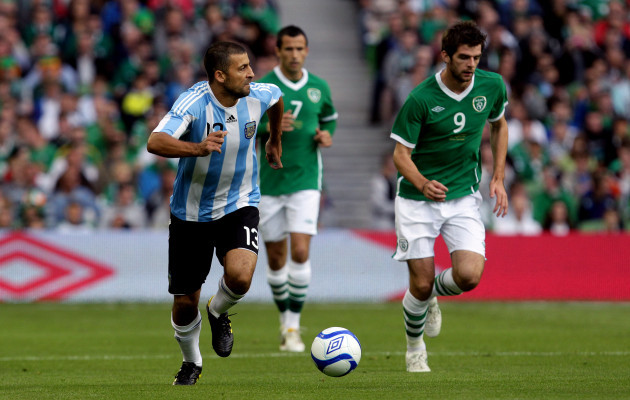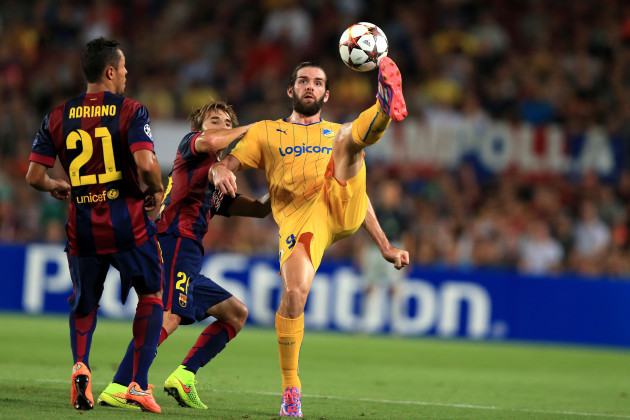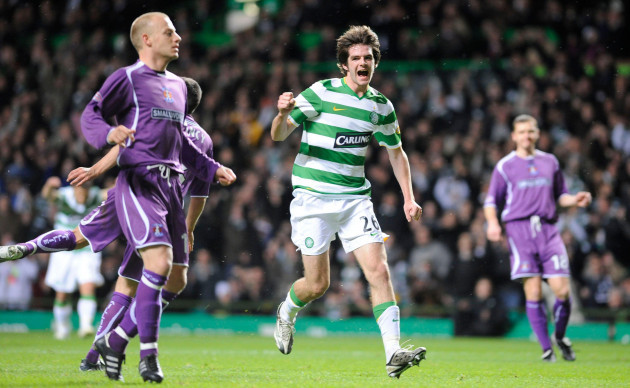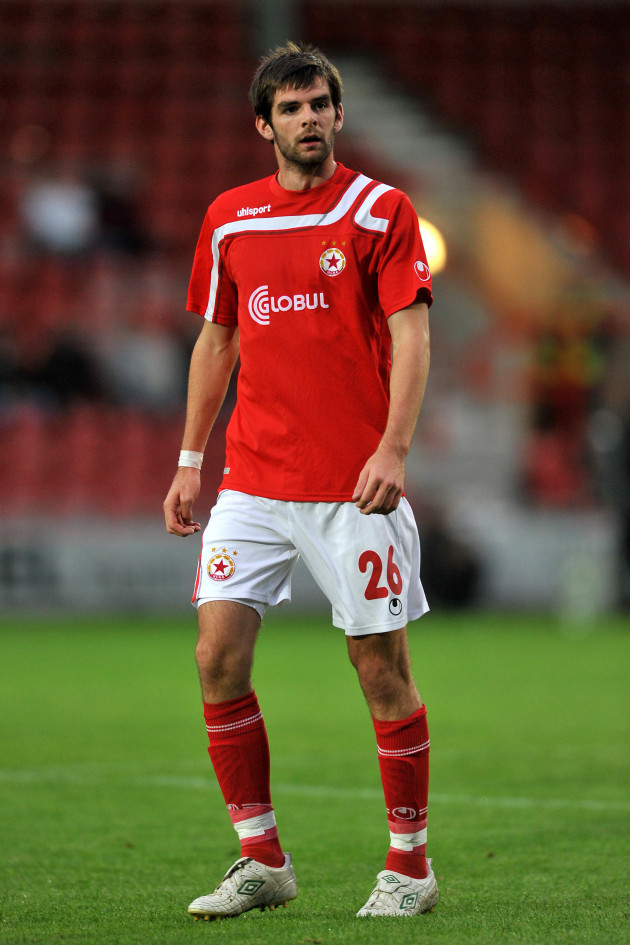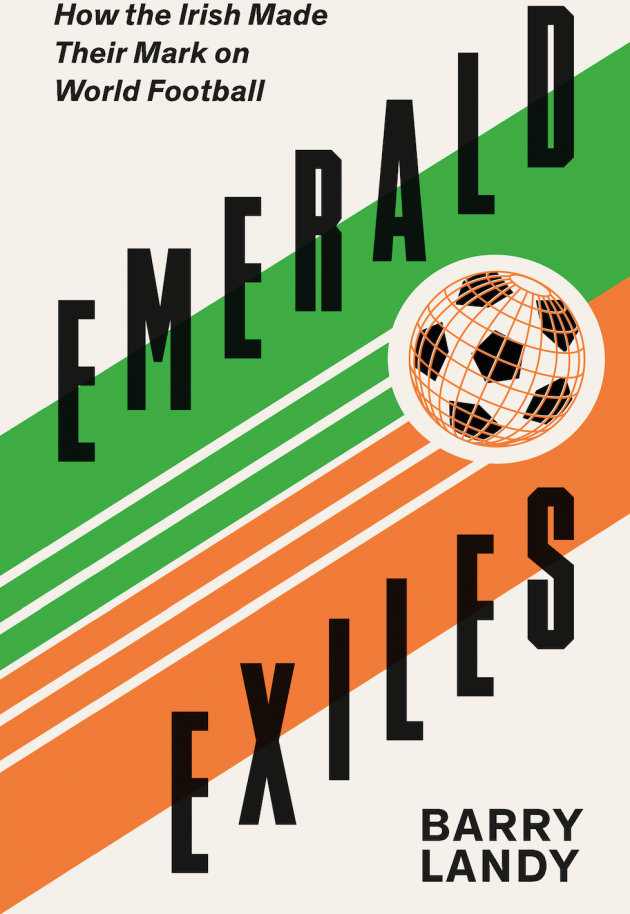THE FOLLOWING IS an extract from a new book called Emerald Exiles: How the Irish Made Their Mark on World Football by Barry Landy.
In the last decade, a new wave of Irish talent has taken to continental Europe – and not just Italy – to further their careers and chase glory and opportunity they may otherwise have never been afforded. Naturally, Europe has been the location for the majority of the country’s footballing emigrants given ever-improving transport links and historically long-established domestic football infrastructure across the continent.
It hasn’t just been lower league journeymen or League of Ireland stalwarts that have sought a new start on European soil either. Full internationals, both men and women, continue to look to Europe. None have committed themselves to the notion of playing abroad quite like Cillian Sheridan.
It was September 2014. Martin O’Neill had been in the Republic of Ireland hotseat for ten months. The Derry man was sitting in the media room at the FAI headquarters in Abbotstown, North County Dublin, flanked by the association’s then communications director, Peter Sherrard, as O’Neill announced a thirty-seven-man squad for the upcoming Euro 2016 qualifiers against Gibraltar and Germany.
It was customary during O’Neill’s tenure to name expanded squads, which would then be reduced as the matchdays approached. Speaking to the assembled media, he joked, ‘The only player missing from the last thirty years is Paul McGrath. I’ve excluded a few fellas who’ve just died.’
The laughter in the room was far from riotous. As tends to be the case when members of the press are attempting to curry favour with a manager, it was more sycophantic in tone. Given what was considered to be a genuine paucity of players from which to choose, O’Neill’s bloated squads were designed to be an indication of his willingness to cast his net far and wide.
After all, Ireland were in no position to overlook any player who may add something to a squad that had over several years seen their representation in the English Premier League dwindle.
One interested observer of the squad reveal was in Cyprus, fostering his own hopes of making the provisional panel. Cillian Sheridan was following closely the news emanating from Abbotstown. However, the APOEL Nicosia striker turned out to not be among the eight strikers picked for O’Neill’s squad. Having not received a call-up since 2010 under Giovanni Trapattoni, his exclusion was no surprise. Sheridan had hopes, but not expectations.
Nevertheless, the manager’s joke rankled with him. If he wasn’t to get a shot now, then when? Six days earlier, Sheridan had led the line for APOEL in their UEFA Champions League clash with Barcelona at the Nou Camp, in which Gerard Piqué’s goal had secured a narrow win for the Catalans.
Since the Cypriot club had qualified for the group stage – making Sheridan Ireland’s only representative in the competition that season – O’Neill had been regularly questioned on whether or not Sheridan would be called up. As England’s top clubs no longer had Irish players in their squads, local interest in Europe’s premier club competition had all but petered out.
Could Ireland really afford to ignore a player who was rubbing shoulders with Lionel Messi, Luis Suárez, Neymar, Zlatan Ibrahimović and Edinson Cavani? Fifteen members of O’Neill’s squad were plying their trade in England’s second tier, the Championship. LA Galaxy’s Robbie Keane was, at thirty-four, two years away from his international retirement.
Goals and where they were to come from now and in the future dominated the thoughts and minds of those invested in Irish football matters. Sheridan never considered it a certainty that he would do any better than the players at the manager’s disposal, but he was convinced he was deserving of an opportunity to be amongst them.
I was annoyed at that joke,’ Sheridan says. ‘I’d like to think he knew who I was, I don’t know. I was never afraid to go abroad and think it was going to damage my chances.’
O’Neill indicated to the media that day, and on several other occasions, that he did in fact know Sheridan. After all, the Bailieborough man had begun his career at Celtic, where O’Neill had enjoyed five trophy-laden years. However, on that day in Dublin he did admit to journalists that he hadn’t watched the Champions League group game from the week before.
The well-travelled striker says he was embarrassed by much of the coverage he received that season. The Irish media were very keen to talk about ‘the only Irishman in the Champions League’. Between 2000 and 2010, nineteen Irish players had taken part in the competition proper. In the decade to follow, that number fell to just six.
Three of those – Anthony Stokes, Eoghan O’Connell and Jonny Hayes – played for Celtic. Therefore Sheridan, playing on the continent and in a group containing the might of Barcelona, the petrodollar-fuelled Paris Saint-Germain and European greats Ajax, was someone to really latch onto.
Still, Sheridan was certainly showing strong form at the time. And he believed he was now finally getting the sort of opportunities that validated his decision to play outside of the UK, a choice that had led him down a winding path.
At just twenty-one, he had left Celtic and signed a three-year deal with Bulgarian side CSKA Sofia. Historically, CSKA were the country’s most successful club, with thirty-one league titles to their name. Having weeks earlier broken into the Republic of Ireland senior set-up, it was considered a bold move.
Wasn’t Sheridan concerned of being out of sight, out of mind? Not particularly, as he believed he was moving to a level superior to what he had experienced during loan spells at Motherwell, St Johnstone and Plymouth Argyle.
After all, by the time he arrived, CSKA were a qualifying tie away from a group stage appearance in the UEFA Europa League. The contract dwarfed the terms he was on at Celtic too, which went some way to assuaging any doubts about swapping Parkhead for the Parva Liga.
Those doubts likely resurfaced, though, when, within days of Sheridan signing for the club in August 2010, manager Pavel Dochev was sacked, having lost his first two games of the league season. Two months later, his replacement, Macedonian Gjore Jovanovski, was removed.
It was to prove a turbulent season, although Sheridan’s third manager in two months, Milen Radukanov, did lead the club to a third-place league finish and a Bulgarian Cup win. According to Sheridan, however, he favoured homegrown players. ‘At the time there was a split in the dressing room between the foreign guys and the Bulgarians. He played a lot of Bulgarian players. I felt the dressing room was more hostile than others I’ve been in.’
The dressing room dynamics and managerial upheaval didn’t take the Cavan man by surprise, but those issues were mere indicators of the instability that undermined the club. Sheridan’s long-time agent, John Inglis, who is based in Bulgaria, at least knew the lay of the land. Inglis was forced at one point to advise his client to fake a departure so that he could force through an overdue wage payment, as, at the end of Sheridan’s third month at the club, he had yet to be paid.
Advised that a failure to pay Sheridan as he approached ninety days since his signing would enable him to terminate his contract, the striker called the club’s bluff. He put on a show of saying goodbye to teammates and staff. He didn’t attend the following day’s training session. Instead he stayed home but told the club he was at the airport. His outstanding wages appeared in his account hours later.
It was a game,’ he says. ‘It happened quite a lot. I’ve never been at a club that had so much instability. The panic can start to set in. So many things happened in Bulgaria that after that things were pretty calm. That was almost the best thing to happen to me. For it to go as bad as it went helped me with all the other places I’ve been abroad.’
Things weren’t all bad for the 6’5” targetman in Sofia. He scored seven goals in twenty-six appearances in his first season, but serial changes in the dugout and boardroom ultimately led to him being frozen out. As he was a high earner amongst a constantly evolving playing squad, CSKA were keen to offload.
Opportunities to move to the United States passed by. After a season back in the SPL with St Johnstone, in which Sheridan came to the realisation that he had personally failed to meet professional standards in Bulgaria, he decided to return to CSKA. He did so in a buoyant mood. ‘I wanted to go and prove myself, show them a different player than was there in my first year. I went back with a totally different attitude towards everything.’
Unfortunately, while his mindset had undergone a transformation, the continued unpredictability at the club proved too big an obstacle. In the first leg of a UEFA Europa League tie against Slovenian minnows Mura 05, Sheridan was dismissed by English referee Lee Probert for an elbow on an opposition defender. Despite no language barrier, Sheridan’s resigned protests fell on deaf ears. The game finished scoreless. He missed the second leg, a 1–1 home draw, and CSKA were out.
Fans’ reaction to the ignominy of their European exit led to a huge turnover of players. Some of the sixteen players who had arrived during the summer were told to leave weeks into multi-year contracts.
Sheridan was not one of them, but he was conscious that he was unlikely to be first choice moving forward. Therefore, after playing in just three league games at the start of the season, Sheridan departed for Scotland, joining Kilmarnock. Soon, though, he would again be heading for the continent – this time, Cyprus.
APOEL Nicosia’s new manager, Paulo Sérgio, had earmarked Sheridan as one to watch two years earlier. While manager of Hearts, Sheridan had fired St Johnstone to a 2–0 victory and the next season, with Sérgio no longer in situ but surely watching on, Sheridan hit a hat-trick against the same opposition.
As it was a club that had reached the quarter-finals of the Champions League in the spring of 2012, a little over a year earlier, Sheridan never believed he would be in line for a move to a club of its premier pedigree. In a bizarre turn of events, within months of his arrival, he faced a battle to be even the most popular Irishman among the fervent APOEL supporters.
The club had been knocked out of both Champions League and Europa League qualifiers, and faced a season focused only on matters domestic. That was until the intervention of an unlikely Irish saviour. After Turkish side Fenerbahçe had been banned from European competition as a result of a match-fixing scandal probe, their replacement was to be selected at random from the teams that had lost at the play-off round.
Attending the draw for the UEFA competitions in Monaco, The Irish Times journalist Emmet Malone – as a media representative from a country without a club in the draw – was invited onto the stage at the Méridien Beach Plaza hotel to randomly select the name. APOEL were the team handed a reprieve.
To say Malone instantly garnered cult status at the club would be an understatement. The journalist was invited to Cyprus as a guest of the club’s president, while there were suggestions that fans would produce a banner bearing his name. Amid countless offers of free beer, one fan had his name printed on a club shirt, while some reports claimed an overzealous supporter named his newborn child after the correspondent.
#TEEOTD / August 30, 2013.@IrishTimes' man in Monaco @emmetmalone becomes the toast of Nicosia as he draws out Cillian Sheridan's APOEL out of the hat to enter the Europa League after Fenerbahce were kicked out of European competition. pic.twitter.com/GHJRE4Z0ER
— Emerald Exiles (@EmeraldExiles) August 30, 2021
Sheridan tweeted his reaction: ‘Shit way to qualify but don’t care.’ Malone has since recalled how surprised he was by the reaction to his chance intervention.
Sheridan too was taken aback at the time, but by the size of the club he had joined. ‘It probably took me by surprise at how big the club was, and the pressure the fans put on the clubs there.’ He added, ‘People will say, “it’s a big team but it’s in a small, little league, small country”. Pressure is still pressure.’
Still, he quickly sought to replace Malone as the fan’s favourite Irishman, leading the club to a league and cup double that year, with APOEL earning another league title in Sheridan’s second and final season. His previously mentioned Champions League duels with Europe’s leading lights were as much a highlight of his time with APOEL as the five winners medals (including two Cypriot Super Cups) he picked up along the way. One of several standout moments was scoring the second goal in a 2–0 Cypriot Cup final win over Ermis Aradippou on 21 May 2014.
Somewhat controversially, he joined cross-city rivals Omonia Nicosia that summer, where the goals flowed with more regularity, even though the trophies did not. After eighteen months at Omonia Nicosia, in February 2017 he left Cyprus behind to seek a new challenge in Poland. In the goalscoring form of his life, he sought to strike while the iron was hot.
He still had the Irish set-up at the forefront of his mind. ‘I wanted to go because I thought it would give me a better chance to get into the Ireland squad. I thought they would have deemed the Polish league a better league than Cyprus.’
And he was able to continue his fine form in Poland. ‘When I moved to Poland, playing with Jagiellonia, I was playing really good, scoring. If I was Polish, for that period, I probably would’ve been called up to the Polish national team. They’re quite good at that – when players are doing well in the [domestic] league they call them into the national team.’
Sheridan’s arrival in Białystok, in the north-east of the country, came in the middle of their best-ever Ekstraklasa season. Sheridan hit eight goals in fourteen appearances for the club between March and June of that year, as they finished runners-up. He was scoring as regularly as any Irish striker receiving call-ups at that time. But his phone never rang. There was no new-message ‘ping’.
His first coach at the club, Michał Probierz, offered a helping hand. ‘I remember at international breaks, he’d say to me, “Do you want me to phone someone? Do you want me to phone Martin O’Neill?”.’ Sheridan, with his laid-back demeanour, which perhaps betrayed his genuine desire to achieve further international recognition, declined the assistance. ‘Nah, it’s okay. I don’t want to look too desperate.’
Jagiellonia followed up a second-place finish by again ending the season as runners-up in 2018. European qualification was secured in both instances. In the years since, Sheridan has laid his hat at Wellington Phoenix in the A-League, Israel’s Ironi Kiryat Shmona and back in Poland, with Wisła Płock.
His start at Płock had begun in auspicious circumstances. Making his debut in early February 2020, he entered the fray as a seventy-fourth minute substitute with his new club 2–0 up on Pogoń Szczecin. By the end, they had lost 2–3. A matter of weeks later, Poland, and the world, much like the Płock defence that day, shut down.
Arguably Ireland’s most well-travelled footballer, it is a blessing that Sheridan had the nomadic tendencies that opened his eyes to opportunities all around the world. He believed it would have been difficult to return to any level of prominence in the UK at any time in the last decade after he first made the move east.
‘It’s very hard to get back into the UK once you’ve left. It doesn’t help when every move you make is being described as “obscure”. When I went abroad, I probably felt I was playing the best I ever had compared to when I was younger. I feel like I was a better player, playing with more technical players.’
But the stigma of playing away from the UK still exists,’ Sheridan feels. ‘It’s seen as not good. It’s deemed a bad move. You’re not good enough to play in the Premier League or the Championship, so you go abroad.’
As a result, Sheridan believes there is still a reluctance among Irish players to look overseas for career opportunities. And Sheridan admits that he thought likewise, for a time. ‘Before I went to Cyprus I probably underestimated the quality that was there of players and teams. It’s hard to blame people for being ignorant towards it if they don’t know anything about it.
‘I’m not going to expect people to have a great knowledge of the Cypriot league or the Polish league. I’ve always been lucky that I have Celtic appearances. It gives me a springboard in my career that I’ve played at Celtic. A lot of clubs would start off and say, “he played at Celtic, we’ll give him a chance”.’
However, despite the stigma, it can lead to incredible opportunities. ‘There’s much better players than me that have never got the chance to play in the Champions League or even Europa League because they’ve been in England. They’ve probably made a lot, lot more money, but in terms of getting the chance to play in Europe it’s definitely a better, a more accessible way to do it.’
Sheridan took those opportunities. His varied career is unparalleled, at least by another male Irish footballer – though the same could be said for one Irish stalwart who has enjoyed a decade-long spell in the very best leagues in women’s football.
Cillian Sheridan’s is just one of the many stories that feature in Emerald Exiles: How the Irish Made Their Mark on World Football by Barry Landy. It is available now from Easons and in shops nationwide.
